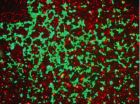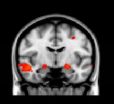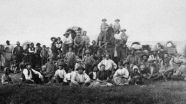(Press-News.org) CHICAGO --- A gel form of tamoxifen applied to the breasts of women with noninvasive breast cancer reduced the growth of cancer cells to the same degree as the drug taken in oral form but with fewer side effects that deter some women from taking it, according to new Northwestern Medicine® research.
Tamoxifen is an oral drug that is used for breast cancer prevention and as therapy for non-invasive breast cancer and invasive cancer.
Because the drug was absorbed through the skin directly into breast tissue, blood levels of the drug were much lower, thus, potentially minimizing dangerous side effects -- blood clots and uterine cancer.
The gel was tested on women diagnosed with the non-invasive cancer ductal carcinoma in situ (DCIS) in which abnormal cells multiply and form a growth in a milk duct. Because of potential side effects, many women with DCIS are reluctant to take oral tamoxifen after being treated with breast-saving surgery and radiation even though the drug effectively prevents DCIS recurrence and reduces risk of future new breast cancer.
The paper was published July 15 in the journal Clinical Cancer Research.
"Delivering the drug though a gel, if proven effective in larger trials, could potentially replace oral tamoxifen for breast cancer prevention and DCIS and encourage many more women to take it," said lead author Seema Khan, M.D., a Northwestern Medicine® surgical oncologist. "For breast cancer prevention and DCIS therapy, effective drug concentrations are required in the breast. For these women, high circulating drug levels only cause collateral damage."
Khan is a professor of surgery and the Bluhm Family Professor of Cancer Research at Northwestern University Feinberg School of Medicine. She also is a surgeon at Northwestern Memorial Hospital and co-leader of the breast cancer program at the Robert H. Lurie Comprehensive Cancer Center of Northwestern University
"The gel minimized exposure to the rest of the body and concentrated the drug in the breast where it is needed," Khan said. "There was very little drug in the bloodstream which should avoid potential blood clots as well as an elevated risk for uterine cancer."
Women who have completed surgery and radiation are given oral tamoxifen for five years to reduce the risk of the DCIS recurring at the same place and of new breast cancer appearing elsewhere in the same breast or the other breast. Tamoxifen is an anti-estrogen therapy for a type of breast cancer that requires estrogen to grow.
Khan and colleagues conducted a phase II clinical trial to compare the effects of the gel, 4-OHT, with oral tamoxifen. They found after six to 10 weeks of gel application that the reduction in a marker for cancer cell growth, Ki-67, in breast tissue was similar to that of oral tamoxifen. The scientists also found equal amounts of 4-OHT present in the breast tissue of patients who used the gel or took the oral drug, but the blood levels of 4-OHT were more than five times lower in those who used the gel.
The reduction in the levels of 4-OHT in the blood also was correlated with a reduction in proteins that cause blood clots.
The study involved 26 women, ages 45 to 86, who had been diagnosed with DCIS that was sensitive to estrogen (estrogen-receptor-positive DCIS). Half the women received the gel, which they applied daily, and half the oral drug, which they took daily.
The gel application may also be more effective for some women. Oral tamoxifen doesn't help all women who take it because it needs to be activated in the liver by specific enzymes and about a third of women lack these enzymes, Khan said. These women may not receive full benefits from the pill.
INFORMATION:
Other Northwestern authors on the paper include first author Oukseub Lee, Katherine Page, David Ivancic, Irene Helenowski, Vamsi Parini, Megan E. Sullivan, Robert T. Chatterton Jr., Borko Jovanovic, Julia Shklovskaya, Silvia Skripkauskas, Piotr Kulesza, David Green, Nora M. Hansen, Kevin P. Bethke, Jacqueline S. Jeruss and Raymond Bergan.
The research is supported by the grant N01-CN-35157 from the National Cancer Institute of the National Institutes of Health and BHR Pharma, LLC.
NORTHWESTERN NEWS: http://www.northwestern.edu/newscenter/
New skin gel fights breast cancer without blood clot risk
Tamoxifen gel stops breast cancer growth and won't cause dangerous side effects
2014-07-15
ELSE PRESS RELEASES FROM THIS DATE:
Game theory model reveals vulnerable moments for cancer cells' energy production
2014-07-15
Cancer's no game, but researchers at Johns Hopkins are borrowing ideas from evolutionary game theory to learn how cells cooperate within a tumor to gather energy. Their experiments, they say, could identify the ideal time to disrupt metastatic cancer cell cooperation and make a tumor more vulnerable to anti-cancer drugs.
"The reality is that we still can't cure metastatic cancer that has spread from its primary organ and game theory adds to our efforts to attack the problem," says Kenneth J. Pienta, M.D., the Donald S. Coffey Professor of Urology at the Johns Hopkins ...
Adolescent males seek intimacy and close relationships with the opposite sex
2014-07-15
July 15, 2014 -- Teenage boys desire intimacy and sex in the context of a meaningful relationship and value trust in their partnerships, according to researchers at Columbia University's Mailman School of Public Health. The research provides a snapshot of the development of masculine values in adolescence, an area that has been understudied. Findings are online in the American Journal of Men's Health.
The researchers studied 33 males who ranged from 14 to 16 years of age to learn more about how their romantic and sexual relationships developed, progressed, and ended. ...
Fish oil supplements reduce incidence of cognitive decline, may improve memory function
2014-07-15
PROVIDENCE, R.I. –Rhode Island Hospital researchers have completed a study that found regular use of fish oil supplements (FOS) was associated with a significant reduction in cognitive decline and brain atrophy in older adults. The study examined the relationship between FOS use during the Alzheimer's Disease Neuroimaging Initiative (ADNI) and indicators of cognitive decline. The findings are published online in advance of print in the journal Alzheimer's & Dementia.
"At least one person is diagnosed every minute with Alzheimer's disease (AD) and despite best efforts, ...
Brain responses to emotional images predict PTSD symptoms after Boston Marathon bombing
2014-07-15
The area of the brain that plays a primary role in emotional learning and the acquisition of fear – the amygdala – may hold the key to who is most vulnerable to post-traumatic stress disorder.
Researchers at the University of Washington, Boston Children's Hospital, Harvard Medical School and Boston University collaborated on a unique opportunity to study whether patterns of brain activity predict teenagers' response to a terrorist attack.
The team had already performed brain scans on Boston-area adolescents for a study on childhood trauma. Then in April 2013 two bombs ...
Study finds unintended consequences of raising state math, science graduation requirements
2014-07-15
WASHINGTON, D.C., July 15, 2014 ─ Raising state-mandated math and science course graduation requirements (CGRs) may increase high school dropout rates without a meaningful effect on college enrollment or degree attainment, according to new research published in Educational Researcher (ER), a peer-reviewed journal of the American Educational Research Association.
VIDEO: Co-authors Andrew D. Plunk and William F. Tate discuss key findings. https://www.youtube.com/watch?v=jwxh1gj-T1M&feature=youtu.be
"Intended and Unintended Effects of State-Mandated High School ...
BUSM study: Obesity may be impacted by stress
2014-07-15
Using experimental models, researchers at Boston University School of Medicine (BUSM) showed that adenosine, a metabolite released when the body is under stress or during an inflammatory response, stops the process of adipogenesis, when adipose (fat) stem cells differentiate into adult fat cells.
Previous studies have indicated adipogenesis plays a central role in maintaining healthy fat homeostasis by properly storing fat within cells so that it does not accumulate at high levels in the bloodstream. The current findings indicate that the body's response to stress, potentially ...
Team studies immune response of Asian elephants infected with a human disease
2014-07-15
CHAMPAIGN, Ill. — Mycobacterium tuberculosis, the organism that causes tuberculosis in humans, also afflicts Asian (and occasionally other) elephants. Diagnosing and treating elephants with TB is a challenge, however, as little is known about how their immune systems respond to the infection. A new study begins to address this knowledge gap, and offers new tools for detecting and monitoring TB in captive elephants.
The study, reported in the journal Tuberculosis, is the work of researchers at the University of Illinois Zoological Pathology Program (ZPP), a division of ...
Protein's 'hands' enable bacteria to establish infection, research finds
2014-07-15
MANHATTAN — When it comes to infecting humans and animals, bacteria need a helping hand.
Kansas State University biochemists have found the helping hand: groups of tiny protein loops on the surface of cells. These loops are similar to the fingers of a hand, and by observing seven individual loops on the surface of E. coli bacterial cells, the researchers found that the loops can open or close to grab iron in the environment.
"These structures are like small hands on the surface of bacterial cells," said Phillip Klebba, principal investigator and professor and head of ...
4 lessons for effective, efficient research in health care settings
2014-07-15
Thousands of studies take place every year in healthcare settings. A report published recently in the American Journal of Preventative Medicine describes how to do many of these studies more rapidly. By taking into account the real-world constraints of the systems in which providers deliver care and patients receive it, researchers can help speed results, cut costs, and increase chances that recommendations from their findings will be implemented.
The lessons come from the My Own Health Report project, a collaboration between seven research institutions with the goal ...
Mormon pioneer mortality rate calculated at 3.5 percent
2014-07-15
The final stanza of the Mormon pioneer anthem "Come, Come Ye Saints" directly confronts the prospect of dying on the trail: "And should we die, before our journey's through…"
Now new research shows that pioneer mortality rates were not much greater than national averages at the time.
This may come as a surprise to modern Mormon youth who've participated in handcart treks.
"The youth go out and learn that a lot of people died and they push the handcart and after three days they think they are practically dead," said retired historian Mel Bashore. "But most people traveled ...
LAST 30 PRESS RELEASES:
Duke-NUS scientists identify more effective way to detect poultry viruses in live markets
Low-intensity treadmill exercise preconditioning mitigates post-stroke injury in mouse models
How moss helped solve a grave-robbing mystery
How much sleep do teens get? Six-seven hours.
Patients regain weight rapidly after stopping weight loss drugs – but still keep off a quarter of weight lost
GLP-1 diabetes drugs linked to reduced risk of addiction and substance-related death
Councils face industry legal threats for campaigns warning against wood burning stoves
GLP-1 medications get at the heart of addiction: study
Global trauma study highlights shared learning as interest in whole blood resurges
Almost a third of Gen Z men agree a wife should obey her husband
Trapping light on thermal photodetectors shatters speed records
New review highlights the future of tubular solid oxide fuel cells for clean energy systems
Pig farm ammonia pollution may indirectly accelerate climate warming, new study finds
Modified biochar helps compost retain nitrogen and build richer soil organic matter
First gene regulation clinical trials for epilepsy show promising results
Life-changing drug identified for children with rare epilepsy
Husker researchers collaborate to explore fear of spiders
Mayo Clinic researchers discover hidden brain map that may improve epilepsy care
NYCST announces Round 2 Awards for space technology projects
How the Dobbs decision and abortion restrictions changed where medical students apply to residency programs
Microwave frying can help lower oil content for healthier French fries
In MS, wearable sensors may help identify people at risk of worsening disability
Study: Football associated with nearly one in five brain injuries in youth sports
Machine-learning immune-system analysis study may hold clues to personalized medicine
A promising potential therapeutic strategy for Rett syndrome
How time changes impact public sentiment in the U.S.
Analysis of charred food in pot reveals that prehistoric Europeans had surprisingly complex cuisines
As a whole, LGB+ workers in the NHS do not experience pay gaps compared to their heterosexual colleagues
How cocaine rewires the brain to drive relapse
Mosquito monitoring through sound - implications for AI species recognition
[Press-News.org] New skin gel fights breast cancer without blood clot riskTamoxifen gel stops breast cancer growth and won't cause dangerous side effects




